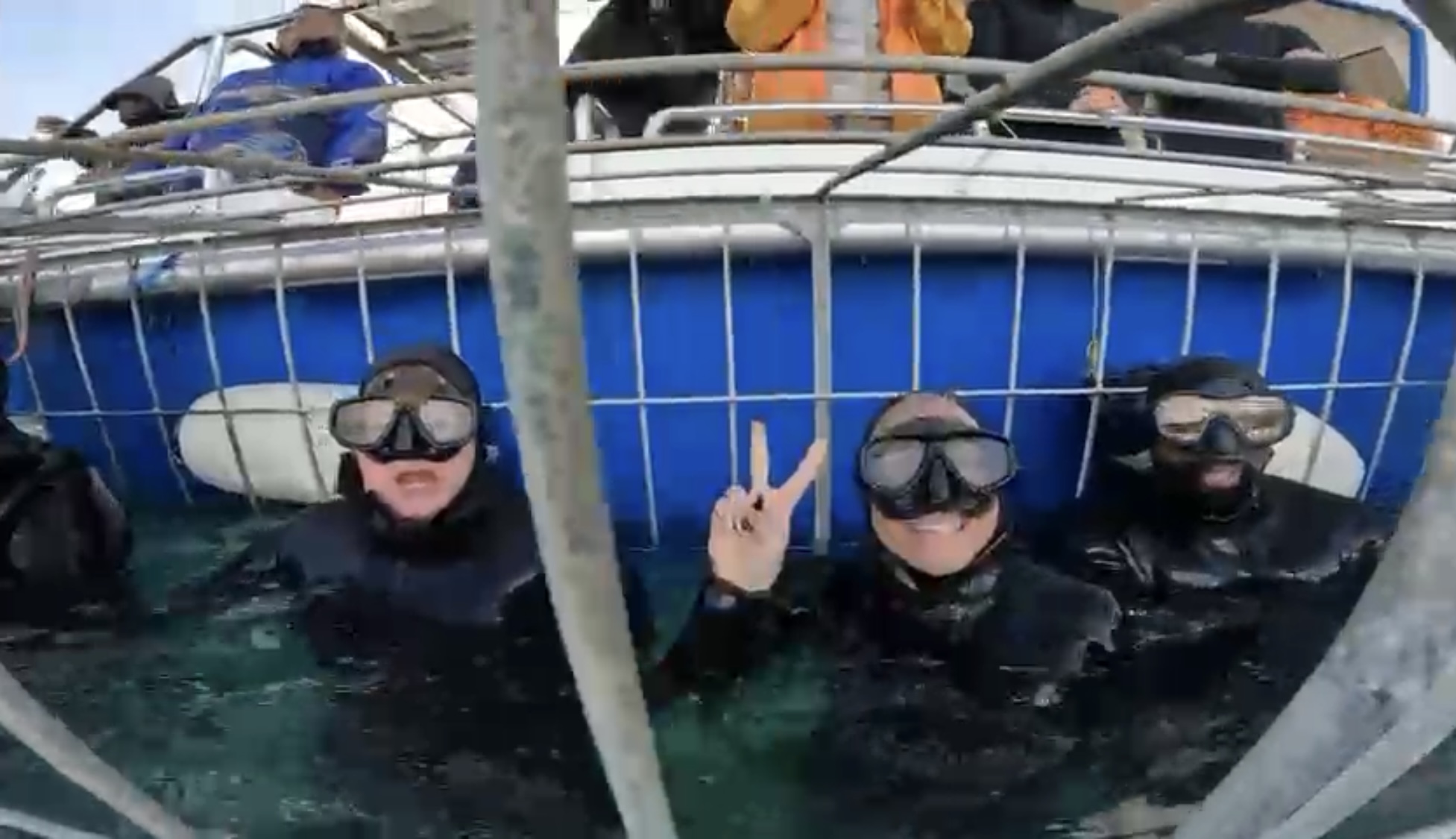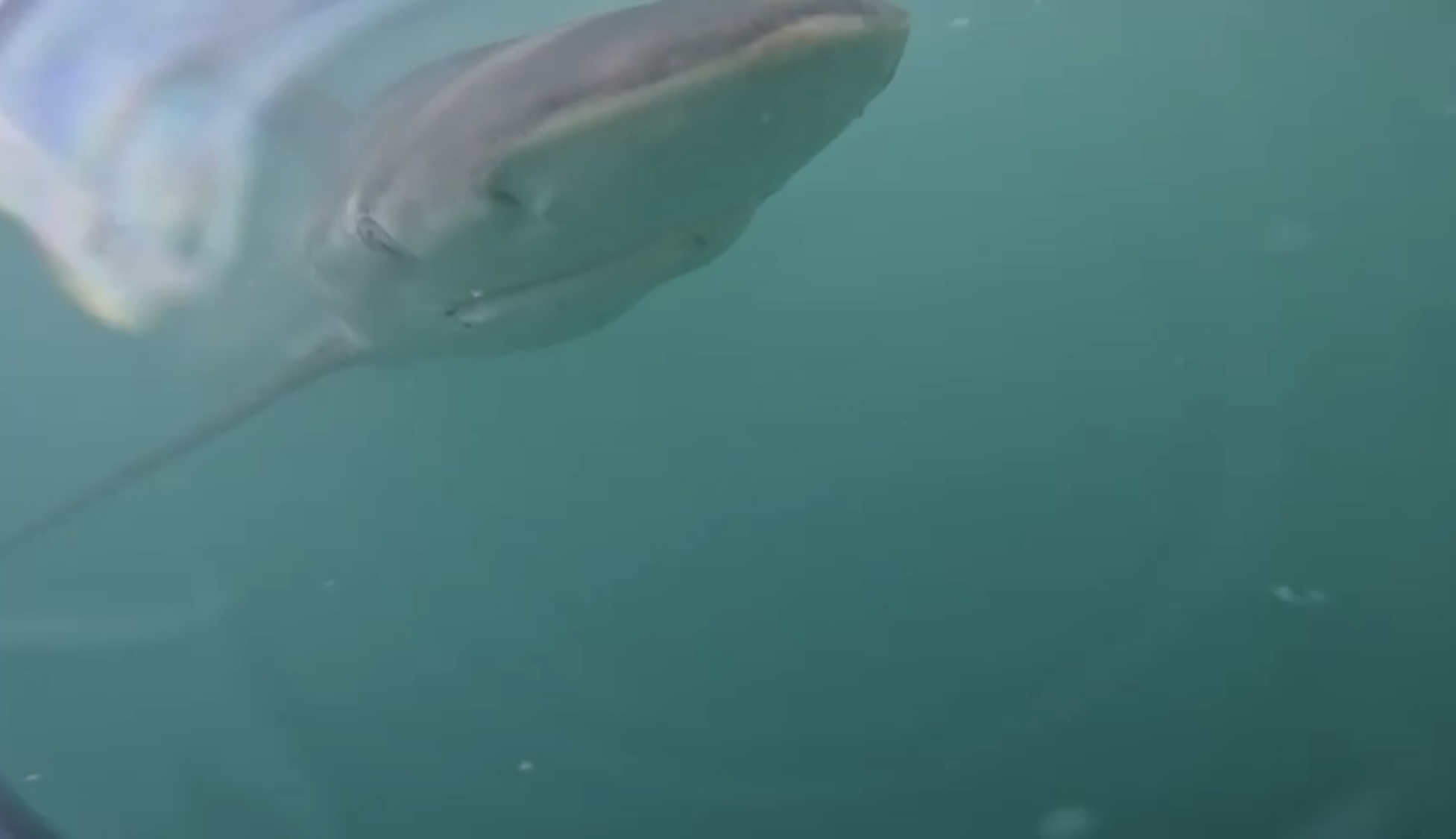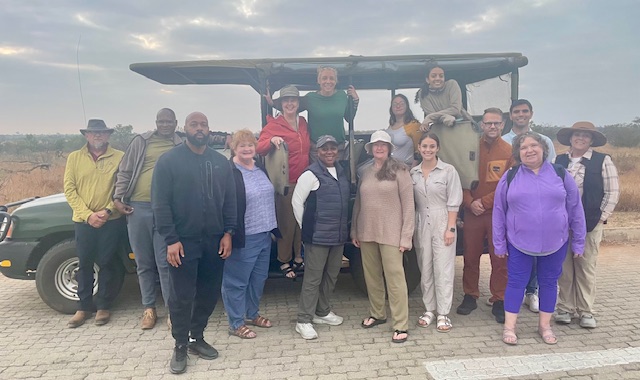Study Abroad Experience in South Africa Speaks to the Souls of Holy Family Travelers
You learn a lot about yourself when you are submerged in 58-degree waters in a steel cage, miles offshore from the Southern-most tip of Africa while a school of five, 11-foot-long female copper sharks swim five inches from your face.

 For Holy Family University sociology professor Dr. Jenai Grigg, who found herself wide-eyed in that cage looking into the souls of those creatures, the experience was unforgettable.
For Holy Family University sociology professor Dr. Jenai Grigg, who found herself wide-eyed in that cage looking into the souls of those creatures, the experience was unforgettable.
“I wouldn’t say I was scared,” Grigg said of the adventure. “Honestly, I was more afraid of the water temperature. I was just in awe. There is something about being, literally submerged, in their environment, up-close and eye-to-eye in their water. People had told me that sharks are soulless, and I was trying to see for myself. I don’t think they are. I think there is a lot going on there, and seeing all of these female sharks circling together felt intentional to me. They were a community.”
The experience was just one of many memorable moments for Grigg who had the privilege to lead a group of 11 others from the University through a 17-hour flight and on an 11-day intercultural studies trip in South Africa through Education First (EF)’s Study Abroad program in May. Faculty members Dr. Pat Griffin (criminal justice) and her two adult children, Connor and Michaela McGlynn, Dr. Diane Menago (director of the PsyD. Program) and Dr. Shelley Robbins (psychology faculty) were among the contingent that included undergraduate and graduate faculty and students, administration, alumni, parents, families, and friends.
The tour began in Johannesburg where they visited the homes of Winnie and Nelson Mandela and Bishop Desmond Tutu, and toured the Apartheid Museum. The cultural immersion continued to the UNESCO World Heritage Cradle of Humankind, home to approximately 40-percent of the world’s human ancestor fossils, and a guided tour of the Sterkfontein Caves. Then it was onto Kruger National Park, where the group spent the night under a blanket of stars, taking in the Southern Cross, before venturing out on safari vehicles for a full-day game drive.
“This portion of the trip was very educational as we visited the Court of Human Rights and a prison that was still operating as such in the 1990s, very recent history that was poignant and powerful,” Grigg said. “We took this glass elevator into the third largest canyon in the world. We rode toboggans down the side of the mountain. The lodge where we stayed in Kruger National Park was next to a preserve. I’m walking to my room at night, and there is a zebra just running past me. And a wart hog was circling my room. On the full-day game drive, we saw a lioness, elephants, zebras, giraffes, baboons, water buffaloes, and wildebeests. One of our students was trying to eat a banana, and a monkey just stole it from her. It was so great.”
From there, the group flew to the harbor town of Cape Town for the shark encounter, whale watching, a visit to Nelson Mandela’s prison cell and even a stop at a penguin colony. The visit concluded with a trip to the Kirstenbosch Botanical Gardens to view flora and fauna that are unique to South Africa.
“This opportunity was a lifetime dream and exceeded any of my expectations,” Menago said. “For me, the trip was historical and educational and allowed me to see nature in a way I have never done before. Most memorable were the historical components regarding apartheid and learning about the evolution of humans where some of the oldest remains in the world were found was profound. The ability to see nature up close and personal, including taking a cable car to the top of Table Mountain and going on a whale watch off the Cape of Africa, was like nothing I have ever experienced. I think what affected me most was the people that we met. They were so incredibly kind and demonstrated such gratitude for everything they had. For me, it is a reminder to be grateful for what I do have and to demonstrate appreciation for that every day.”
“This trip changed me in a number of ways,” Griffin said. “Our tour of the Constitution Court showed me the importance of paying attention to the design of a space as this communicates meaning. The intentionality of use of color, wood, and seating arrangement was so important in this structure and was intended to serve as a reminder of the history of the country, hope for the future and change. I also took away the importance of high-impact practices, such as this study tour. The safari was amazing and the natural beauty of Cape Town was second to none. These experiences are becoming more central to how I want to carry out my work as an educator. Our driver, for example, spoke the Khoisan language, which includes click consonants, showing me the importance of listening and communicating around language.”
“All of the plants there were different from anything we had ever seen before,” Grigg said. “They look more prehistoric. The African people were the kindest people I have ever met in my whole life, full-hand extension, full smile when they greet you. The food was delicious, a lot of different kinds of meats and a lot of curries and stews, with a Malaysian influence. The sunrise on our safari day was so spectacular. It looked like you used a filter on your phone. It was autumn, almost winter, when we went so you didn’t have to worry about mosquitos. Music was everywhere, and young kids had their ankles tied with bracelets made from soda can tabs, so when they were stomping and dancing, they would jingle and make beautiful music.”
It is these appeals to the five senses, and the memories that they created, that Grigg hopes all Holy Family University students and colleagues returned with from South Africa and what they take away from all trips abroad.
“It is always the same for me, “ said Grigg, who has led expeditions to popular destinations like France and Italy, but also to China, Japan, and Morocco during her time at the University. “The hope of any study abroad trip is to understand a little bit of difference but also the commonality. I always hope students say, ‘Wow! I got to broaden the way I think about the world because I got to see the way someone else lives.’ It’s amazing that you can come clear across the planet and see that family is still important and that humankind functions in universals. It also is important that we get to bring the humanity of America with us to these places and that we show our students the importance of being good ambassadors for our country.”
Like those sharks that circled her, Grigg is on a mission to show the world that American tourists, especially those from Holy Family University, are not the self-centered, high-maintenance, arrogant people that their tour-guide, Hercules, and others were anticipating them to be. Instead, they got a glimpse at their collective souls.
“It felt good to show the humanity of America to our friends in Africa,” she said, “and to bring their humanity home with us.”

